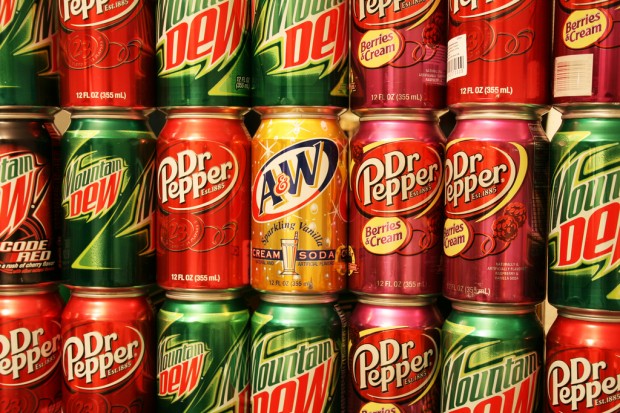Last summer, the Board of Supervisors put Prop. E on the ballot -- a 2 cents an ounce tax on sugar-sweetened beverages. And just as it has in multiple places across the country that have tried taxes, warning labels or bans on extra-large drinks, the American Beverage Association swooped in and opened its wallet.
San Francisco is currently flooded with TV and radio ads paid for by the beverage association. It has poured in $7 million and counting, on track to be the most corporate money ever in any San Francisco campaign.
So why are cities so intent on taxing sugary drinks? They say it's a health issue. Dr. Robert Lustig specializes in pediatric endocrinology at UC San Francisco where he treats a lot of children with diabetes. To Lustig, sugar is the enemy of good health. "Sugar goes to your liver and makes your liver fat which causes all the chronic metabolic diseases we know about," he says, including "type 2 diabetes, heart disease, hypertension, lipid problems."
Sugar-sweetened beverages are concentrated doses of sugar. For example, a can of Coke has nine teaspoons' worth. That extra sugar is helping drive up the rate of type 2 diabetes, among other illnesses, Lustig says.
The idea of a sugary-beverage tax is to make those drinks -- not just sodas, but other beverages such as energy and sports drinks -- more expensive. Then consumption will go down, says Prop. E co-author San Francisco Supervisor Scott Wiener. That's what happened in Mexico after its soda tax took effect on January 1.
Soda Tax Affect on Consumption
"Mexico with a smaller soda tax experienced a quick 10 percent drop in consumption," Wiener said. Since San Francisco's tax is bigger than Mexico's, the consumption could decline as much as 31 percent, according to an analysis from the city and county's office of economic analysis. Wiener said that effect would be "huge."
A huge drop in consumption could lead to a huge drop in revenue for beverage companies. The American Beverage Association's spokesman in the Bay Area is Roger Salazar. "We think taxing people for the food and beverage choices they make is just bad policy in and of itself," Salazar said.
He argues that a tax leads to job loss. The beverage association also paid for an economic analysis, which forecast the tax would cost 1,000 jobs in San Francisco. Salazar says people running corner grocery stores, for example, work on tight margins and any extra expense can cost jobs.
Then there's the revenue side. San Francisco's tax is estimated to bring in $35-54 million a year. Supervisor Wiener says that money is specifically earmarked for nutrition and physical activity programs, mainly in schools and parks. "It will actually create jobs in those areas," he said. Wiener says the city's own economic analysis found only limited job loss.
But because Prop. E's funds are earmarked funds, a two-thirds supermajority of San Francisco voters needs to approve it. That's different from the soda tax measure across the bay in Berkeley.
Measure D in Berkeley
Berkeley's Measure D would mandate a penny-an-ounce tax. Unlike San Francisco, the proceeds, estimated at a million dollars per year, are not earmarked. That means Measure D needs only a simple majority to pass -- 50 percent plus one vote.
That approach failed in the California cities of Richmond and El Monte in 2012. Many people didn't trust the money would be spent on health programs. Berkeley's Measure D does create a panel of health experts to advise the City Council on health programs worth funding. But this promise doesn't satisfy self-described liberal Jill Hershman. The longtime Berkeley resident says she is voting against Measure D. "Even though the city council has promised that they intend on spending the money on school and health programs," Hershman said, "in the end, they don't really have to, and there's no guarantee that this measure will fund anything that helps kids."
Still, every major candidate running for office in Berkeley -- and a long list of health and community groups -- support the measure.
In an effort to get its message out, the beverage association is spending big in Berkeley, too, close to $1.5 million so far. Spokesman Salazar makes a similar argument that critics made in Richmond two years ago: that this tax hits low-income people the hardest. "There are ways in which we can promote healthy lifestyle choices," he says, "but taxing people, especially in a way that impacts the lowest income of our residents is not the way to go about it."
Supervisor Wiener counters that it is diabetes and other health problems that are regressive. "We know the soda industry targets low income people, targets communities of color with its marketing," he said, "and the diabetes explosion that is fueled by these drinks is worse in communities of color than it is in the broader community."
